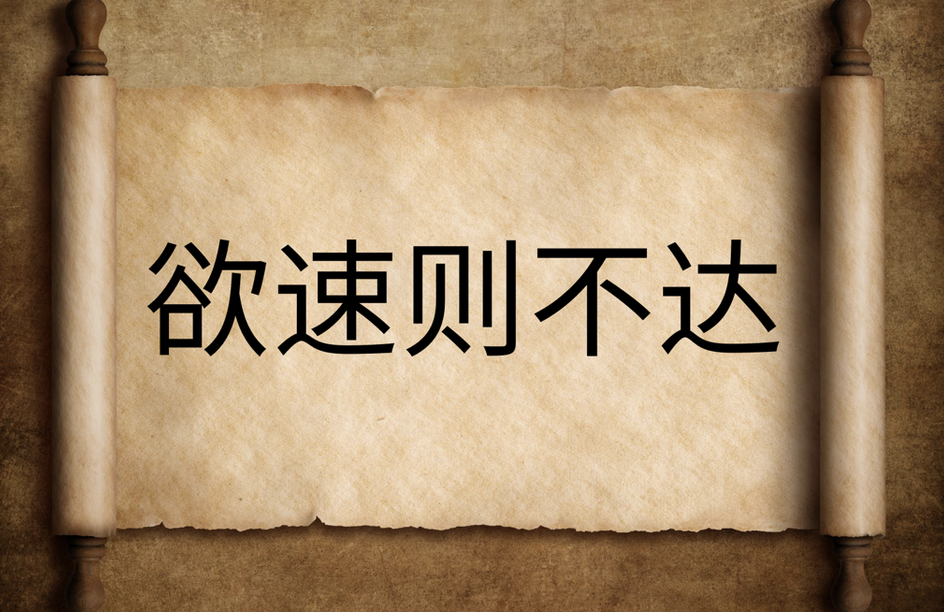
欲速则不达 A Piece of Ancient Chinese Wisdom We Can All Learn From
The Chinese language possesses an undeniable beauty of expression…
With just a few characters a writer can capture a complex idea and evoke powerful feeling. This is particularly true the case of Chinese idioms, known in Chinese as the “chengyu.” Usually consisting of 4 or more characters these short phases can communicate a lot of meaning. And there are plenty of them- in fact there are over 5000 individual phrases- all with their own meaning and historical context. Take the phrase “Add feet to the snake,” which is a metaphor for not overdoing something. The story harkens back to the Chu dynasty over 2000 years ago- and is still used today. Within the vast library of Chinese idioms, there are countless stories and lessons to learn from.
There’s a chengyu for every situation
Cue my host-dad, a wonderful older gentleman who let me live in his home while I attended a study abroad program in Beijing as a high-schooler. Like many older scholars of Chinese… he can assuredly tell you…. there isn’t a situation that doesn’t call for chengyu. Have to learn a lesson the hard way? – chengyu. Make a new friend- chengyu. Break-up with your girlfriend- chengyu. Don’t feel like hearing another chengyu- there is a chengyu for that too. There have been plenty of times students of Chinese have said to themselves “not another chengyu!” But there are a few chengyu’s that do get through to you one way or another.
欲速则不达 What does it mean?
There is one idiom that I have kept in mind over the years that has made a particularly strong impact on me. Here it is: 欲速则不达. What does it mean? My favourite translation goes like this- “make haste slowly.” You may have to pause and think about it for a second. Perhaps, the English phrase most similar in meaning is probably “don’t try to run before you can walk.” Its roots run deep into Chinese history; it’s said to originate from Confucius’s advice to one of his favourite students, eager to make changes in his newly appointed government role. Confucius urged his student to not act too hastily without properly thinking through his long-term strategy. If things are done too quickly, Confucius argued, the desired outcome would become impossible.

I remember clearly when I first learned this phrase- perhaps another reason why this phrase still resonates with me today. I was 19 years old, spending my summer working as a volunteer for the 2008 Beijing Olympics. My good friend and language buddy Huang Guoxian, who was also a young volunteer, was helping me practice Chinese at work. Like all students of a foreign language have experienced, my brain was not clicking that day. I remember making mistake after mistake trying to explain a work task to a group of colleagues. In particular, I struggled with some technical words that I didn’t fully understand or master prior to using. I pouted out loud and he could sense my frustration. It was then that Huang Guoxian took me aside. He put his arm around my shoulder and explained patiently Confucius’s ancient logic. Unlike many unwanted chengyu remarks alluded to earlier, this chengyu lesson presentation was appropriate. Instead of rush to communicate in Chinese like my more experienced counterparts, I needed to spend more time learning the technical words and taking baby steps to get better.
Mindful steps forward
What I like about the wisdom of 欲速则不达 is that it also infers haste must still be made. One cannot merely do things more slowly and be successful. One must be mindful to not rush and instead diligently improve. What Huang Guoxian taught me that echoes in my life today. There is no reason to beat yourself up over lack of quick improvement. What’s more important is that you are putting in the focus to do things right the first time. It can be argued that in today’s culture, with distracting technology’s omni-presence, the ability to focus on the hard work is more difficult than ever. That’s why now more than ever when starting a new activity, relationship or business venture, it’s important to remember to “make haste slowly.”

- Think about what goals in life you are itching to achieve
- Write them down
- Be realistic with timelines
- Set your long-term goal and stick to it
- Don’t worry about the small setbacks
- Slow Down!
- Give yourself more time to complete a task well, rather than feeling pressure to rush
- When working deeply turn off all electronic distractions
- Take breaks to rest your mind
- Don’t beat yourself up
- Accept that good work takes time
- Adopt a positive attitude when it comes to slow progress
- Give yourself small rewards for incremental progress
Do you have a chengyu that inspires you every day? We’d love to hear from you at info@wellmagazineasia.com.
Written exclusively for WELL, Magazine Asia by Jackson Kelleher
Thank you for reading this article from WELL, Magazine Asia. #LifeUnfiltered.
Connect with us on social for daily news, competitions, and more.






